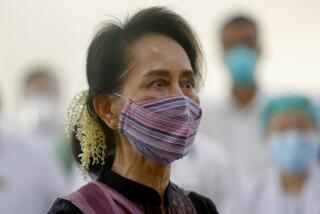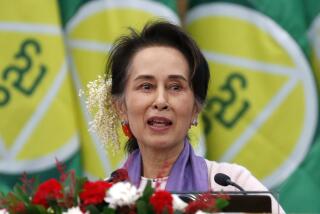U.S. move signals belief that Myanmar has changed its stripes
- Share via
Reporting from Washington — President Obama’s decision to send Secretary of State Hillary Rodham Clinton on a groundbreaking trip to long-isolated Myanmar next month signals U.S. confidence in a recent flurry of political reforms by the repressive regime that has ruled the country for five decades.
For three months, administration officials have hailed signs of democratic change but questioned the motives of the ruling military elite, which has jailed its opponents and engaged in human rights abuses to maintain political control of the resource-rich but impoverished Southeast Asian nation.
A more positive view of the current leadership began to coalesce after Derek Mitchell, the U.S. special envoy for Myanmar, also called Burma, made two visits in the last month. Aides said he held dozens of meetings with senior officials, including the minister of defense and leaders of the legislature.
American visitors “have been cautious at first, but now they’re starting to believe their eyes and ears,” said Ernest Bower, a Southeast Asia specialist at the Center for Strategic and International Studies think tank in Washington. “It’s been, ‘Wow.’”
Clinton will meet senior government leaders as well as members of the political opposition on her Dec. 1-2 trip, officials said.
In an interview Friday with NBC, Clinton urged the ruling generals to release remaining political prisoners, move ahead with promised electoral reforms and halt the ethnic persecution that has created thousands of refugees.
Encouragement for a diplomatic opening also came from Myanmar’s most prominent reformer and former political prisoner, Aung San Suu Kyi. The Nobel Peace Prize laureate announced Friday that, after two decades of persecution, her party would formally rejoin the political system by registering for future elections.
In a 20-minute phone conversation with Obama, Suu Kyi urged the United States to continue moves toward diplomatic normalization and emphasized that her own discussions of reforms with the government had been productive, U.S. officials said.
Another factor in the U.S. decision is that Myanmar’s longtime dictator, Gen. Than Shwe, now 78 and retired, does not appear to be undermining the political changes. Some experts speculate that he believes his personal and family interests will be safer under a more democratic government.
“The fear now is not that these are simply symbolic changes or less than significant reforms,” a senior administration official told reporters after Obama announced Clinton’s visit at a regional summit in Bali, Indonesia. “I think the concern is … how to make sure they are locked in going forward.”
At the summit, the 10 nations in the Assn. of Southeast Asian Nations, a key regional group, showed support for Myanmar’s efforts to gain legitimacy by selecting it as chair of the next gathering in 2014. As a result, hundreds of diplomats, journalists and others will gather in Yangon, formerly called Rangoon, for the first time in generations.
U.S. officials caution that normalization of relations isn’t likely any time soon.
Washington won’t want to post an ambassador until democratic reforms are more certain. Lifting economic sanctions imposed on Myanmar over the decades would require approval by Congress and other governments, a process that “may take years,” an official said.
For the Obama administration, a new relationship with Myanmar offers considerable benefits as well as risks.
American businesses are eager to establish trade relationships for oil and gas reserves, timber, gems and other natural resources.
U.S. officials hope to see Myanmar not only release thousands of political prisoners but also allow free markets and pluralistic government. The goal is to pull the nation into regional trade and security alliances and away from its traditional patron, China.
They also hope to persuade Myanmar’s leaders
to curtail suspected secret missile and nuclear development programs with another isolated state, North
Korea.
On a political level, a thaw with Myanmar would be a rare success for Obama’s policy of “engagement.” As a presidential candidate in 2008, he pledged to talk without preconditions to authoritarian regimes, but the approach has failed to yield benefits in Iran, Cuba, North Korea and Syria.
Many Myanmar exiles and dissident groups remain skeptical. They point out that the regime has held elections, allowed political parties and rewritten constitutions several times since the military seized power in 1962.
“It’s not the first time they’ve changed to suit their interests,” said Ko Pauu, a blogger living in Singapore. “But if you look close, there’s no democracy.”
Times staff writers Peter Nicholas in Bali and Mark Magnier in New Delhi contributed to this report.
More to Read
Sign up for Essential California
The most important California stories and recommendations in your inbox every morning.
You may occasionally receive promotional content from the Los Angeles Times.













